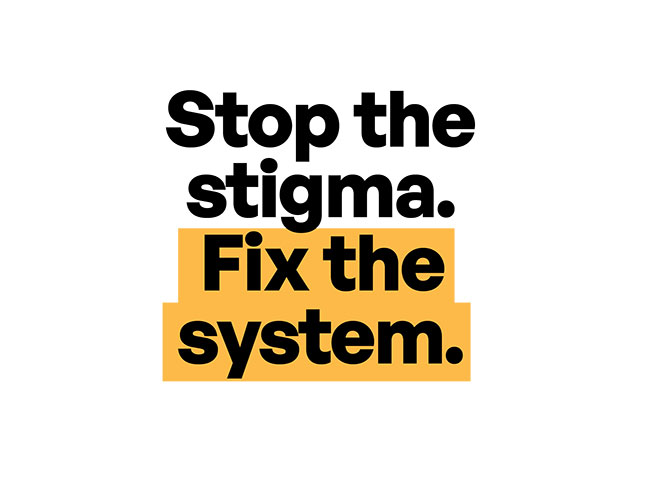From stigma to support
Rebuilding trust in our social security system.

Introduction
During hard times, we would all want to be treated with dignity and respect. Like our NHS, our social security system was set up to be there for all of us. It should give us security when we're not well and confidence to find our next career move.
However, our ‘Stigma in the System’ research with the University of Bristol shows that stigma embedded in our social security system is harming people’s confidence and wellbeing and pushing them towards financial crisis. It lays bare the urgent need for reform built on dignity, fairness, and trust.
Based on the findings from that research, below we outline our recommendations for the government to create a trusted and effective social security system.
Or you can download our full policy report here.
About Turn2us
Turn2us is a national charity offering information and practical help to people facing financial insecurity. We know that many people struggle to access the social security support they are entitled to because of stigma, misinformation, or complex processes.
Our Benefits Calculator and Grants Search tools show users what support they are entitled to. In 2024-25 we made grants of over £3.3 million supporting 2,277 people across the UK. 2.4 million people used the tool in that period. Of those, 1.5 million people found new benefits they're entitled to, worth an average of £5,396 each.
This amounts to £12.9 billion in annual benefits income that would otherwise go unclaimed. To support people to access PIP, we developed the Turn2us PIP Helper tool with those in receipt of PIP, to simplify the complex application process, making it more accessible and less daunting.
People facing financial insecurity play a core role within Turn2us and are at the centre of our policy and decision-making.
Their expertise and insights shape our work, ensuring that our tools, programmes and policies are relevant, meaningful and free from stigma.
About Stigma in the System
This report’s recommendations are based on the findings of Stigma in the System - a report released in September 2025 from the University of Bristol’s Personal Finance Research Centre. Commissioned by Turn2us and generously funded by Royal London, one of our long-terms strategic partners, this research explores how stigma shapes experiences of the UK social security system.
Using secondary data analysis, qualitative interviews, and a nationally representative YouGov survey of 4000 people, this research examines how stigma is produced, reinforced, and experienced in the UK social security system; how it shapes perceptions and behaviours; and what this means for financial security and wellbeing.
It explores its drivers, its impact on both claimants and non-claimants, and the changes needed to create a system that supports people with dignity and fairness.
The University of Bristol Personal Finance Research Centre is an interdisciplinary research centre exploring the financial issues that affect individuals and households, with a particular focus on low-income, marginalised or vulnerable groups.
Executive summary
Almost all of us will need the social security system at some point in our lives. It was designed to be our safety net if we become unwell or our employers go under. It is there when we retire, and should ensure we’re still able to feed our families if we are paid too little or we face additional costs due to disability.
However, at the moment, rather than providing the support people need to get back on track, it often makes difficult times even harder.
In September 2025, we released research with the University of Bristol, showing how our society’s stigma (distrust and negative views of benefits and claimants) has been baked into its design. This means, at the point when we most need support, we are treated with suspicion and contempt. Not only is this hugely harmful to people, but it also makes the system error-prone, inefficient and ineffective.
In its Get Britain Working White Paper and Pathways to Work Green Paper, the government set out plans to reform employment support and health and disability benefits. The common goal for its various reforms is to support more people to move into, and progress in, work.1
In its diagnosis and solutions, the government recognises the need to move away from Jobcentres focusing on monitoring claimants and set out ambitions for genuine skills and careers support.
It acknowledges that many people are scared to try work, because they fear losing support, and are legislating for a ‘right to try’ guarantee.2
The government rightly condemns the negative experience people have when applying for Personal Independence Payment (PIP) and has committed to co-produce a review to improve the PIP assessment.
However, there is a real risk that the government fails to recognise the extent to which stigma – baked into the design of the system and in the government's language - is eroding trust and pushing people further from employment. The Stigma in the System research found that:
- A culture of surveillance and the threat of sanctions are eroding trust in work coaches. 64% of claimants surveyed felt the system was trying to catch them out.
- ‘Soul destroying’ PIP assessments are worsening claimants' mental health and 80% of PIP claimants regularly fear their critical support will be taken away.
- Frustrating processes are demoralising and leave people feeling ‘hopeless’. Being spoken ‘down to’ means people leave the Jobcentre feeling small.
- Headlines of politicians describing the system as ‘unsustainable’ and talking of ‘spiralling economic inactivity’3 to justify major cuts, is reducing trust in the government’s intentions and increasing fears that support will be taken away.
To fix the system, we need to start with the stigma that is pervasive throughout it. There is a lot that this government can learn from Social Security Scotland, who have put the values of dignity, fairness and respect at the heart of the delivery and are using a trauma-informed approach across all its services.
Whilst the new Adult Disability Payment, which has replaced PIP, is not without its problems, our co-production partners in Scotland have reported much more positive experiences of the system.
Rebuilding trust, boosting confidence and treating people with dignity and respect will be critical to delivering a sustainable system that helps more people to progress and move into work.

1. Transforming PIP: From interrogation to dignified support
Our Stigma in the System research found the process of accessing Personal Independence
Payment (PIP) to be ‘the most problematic and unhappy part of applying for benefits’ with 64% of current PIP claimants saying that the process made their mental health worse.
The application and assessment are difficult and emotionally draining. The points-based system requires claimants to focus on their worst days and the most debilitating aspects of their conditions. Claimants often have extensive medical evidence, only for that to be dismissed by assessors.
This experience of suspicion and mistrust is both cruel and ineffective. 67% of unsuccessful claims taken to tribunal are overturned in favour of the claimant, and these delays to accessing support often lead to significant financial hardship and debt.
The government has set out plans to scrap the Work Capability Assessment in Universal Credit, instead using the PIP assessment to determine eligibility for any health-related
financial support.4
This makes ensuring that the PIP assessment is robust and fair even more important. But further, the government’s overarching ambition - supporting people to work - is being held back by a PIP assessment that makes people sicker and is entirely focused on proving what people cannot do.
Over the next year, the Timms Review will review the role, criteria, and scope of the PIP assessment. We have welcomed the government’s commitment to co-producing the review with disabled people, and organisations that represent them, and we look forward to engaging in this process.
However, based on our insights from the Turn2us PIP Helper and our research, there are specific issues that we recommend the Timms Review consider.
We recommend that the Timms Review considers:
- Learning from Social Security Scotland and exploring where PIP can replicate the Adult Disability Payment system, particularly around reducing the number of assessments and, where assessments are necessary, improving their quality.
- As a critical aspect of an effective assessment, how the PIP application can be made easier to complete.
- PIP assessors receive training that gives them a deeper understanding of the complex interactions between disability and ill health. This would allow them to be less rigid in their assessment and make more nuanced judgements about claimants rather than being prescriptive.

2. Building trust in the DWP: a foundation for effective engagement
Our research demonstrates that most people approach the DWP with significant levels of shame due to societal stigma around people claiming benefits. Work coach and assessor language and actions can either help overcome this internalised stigma - building confidence and allowing people to succeed - or further reinforce it, leading to worsening mental health, reduced confidence and disempowerment.
Effectively assessing the support someone needs to navigate life with a disability, or a health condition, depends on developing a thorough understanding of their unique circumstances, support networks, goals, and the barriers they face. But right now, the lack of trust in assessors and the robustness or fairness of the process makes such open and trusting conversations impossible.
Claimants feel their assessors are trying to catch them out and actively misrepresent what happens in assessments. To help people to return to employment after a setback or progress in work, work coaches need to build people’s confidence, self-esteem and support their future goals. This requires a skilful building of trust and effective coaching.
However, claimants feel that they are being scrutinised, belittled and judged by work coaches. Security guards at Jobcentre doors, a lack of privacy, and screens between claimants and work coaches make the space feel punitive and controlling. The government also needs to address the shortage of work coaches as short appointments and high workloads make it impossible to build trusting relationships with claimants.
We recommend that the DWP:
- Turbocharge its Trauma-Informed Approach Integration Programme, including beginning the rollout of in-depth, comprehensive training for all work coaches and PIP assessors in trauma-informed conversations by the end of 2026.
- Reform Jobcentres and deliver wider employment support in welcoming, community-oriented spaces that prioritise personal support and build trust.
- Increase the duration of work coach appointments to allow for meaningful relationship building and to give work coaches the time to understand individual barriers to work and provide tailored support.

3. Ending surveillance: boosting confidence and hope
A constant focus on surveillance and threat of punishment in our benefits system has not worked. To support people into work, the system should be boosting people’s confidence, self-esteem and hopes for their future. Prescriptive conditionality and sanctions treat people like children, reducing confidence and pushing people into financial crisis.
Further, this approach does not lead to better employment outcomes. Exit rates from Universal Credit into PAYE employment decreases as a result of sanctions and tends to shift people towards lower-paying work.
Whilst there must be consequences for completely refusing to engage, most people want to work. There is no evidence that people who can work don't want to work, and the assumption that they don't is unhelpful to building trust and confidence.
The Jobcentre’s constant focus on checking that claimants are complying with their claimant commitment, means the threat of financial sanctions hangs over every engagement, demoralising claimants, increasing fear of the DWP and reducing trust in work coaches.
As the government rolls out more employment support to people with disabilities and health conditions, it risks failing to learn from the mistakes of past governments by relying on infantilising and prescriptive conditionality.
Instead, we urge the government to focus on voluntary engagement by promoting genuinely useful employment support and rebuilding trust with claimants.
Stigma towards claimants and distrust of the DWP makes it impossible for the system to operate effectively or efficiently.
Cuts to an already inadequate system, or combining increased employment support with prescriptive conditionality, ignores the lessons of the last 15 years. By justifying cuts to eligibility and adequacy by speaking of ‘spiralling inactivity’ and ‘fairness to taxpayers’, the government risks further entrenching the stigma, distrust and fear that has broken our system.
In contrast, by investing in frontline staff, Jobcentres and assessments, the system can be transformed into one that supports and enables people to get on with their lives.
This will mean the system is able to both properly protect those who are unable to work and ensure those who can work are more quickly supported into work that meets their individual goals and ambitions.
Combined with government plans to reduce NHS waiting lists, improve mental health provision and ensure employers provide better support for people to stay in work, this will reduce the support needed from our social security system.
This won’t happen overnight. Changing the culture of Jobcentres and rebuilding trust with claimants will take some time. However, the potential savings are vast. The DWP’s own modelling suggests that supporting someone with work-limiting health conditions or disabilities into full-time employment could lead to societal savings of £28,000 a year, including direct fiscal savings, tax revenue and wider economic impact.5
Therefore, its is easy to see how an effective work coach would pay for themselves very quickly, and bolsters the case for investment in this area.
Finally, politicians, the government and the media need to change the way they talk about our social security system. Almost all of us will need the system at some point in our lives, and our research found that 71% of the public agree that no one should feel ashamed for accessing the support they need.5 Yet 68% of claimants do.
This deeply entrenched view comes from the narratives driven by politicians that demonise any spending on social security and talk of ‘cracking down’ on inactivity and ‘benefit cheats’, pushing grossly harmful misconceptions of widespread fraud or laziness. This not only leads to damaging and isolating shame but also drives mistrust in the DWP and undermines the government’s intentions for reform.
We urge parliamentarians to ensure the language they choose helps to build understanding about the role of our social security system and avoids fuelling harmful misconceptions and stigma. We recommend referring to our ‘Talking About Social Security’ guides.
A safety net that we can all trust to support us when we face tough times is critical to a functioning economy and society. By centring reforms around building trust and treating people with dignity and respect, the government has an opportunity to build a system we can all be proud of.
We recommend that the DWP:
- Adopt the New Economic Foundation’s proposal to promote voluntary engagement for the first three months of a new claim, with the focus on building relationships and co-producing a plan. After that initial period, if there is no evidence of activity or process, a review should take place to explore barriers and decide if more prescriptive conditionality is required. If these requirements are still not met, a warning and a final review should take place before financial sanctions are imposed.
Endnotes
- Department for Work and Pensions. (2025). Pathways to Work: Reforming Benefits and Support to Get Britain Working Green Paper.
- Department for Work and Pensions. (2025). Pathways to Work: Reforming Benefits and Support to Get Britain Working Green Paper p.13.
- Definition from the Office for National Statistics: People not in employment who have not been seeking work within the last 4 weeks and/or are unable to start work within the next 2 weeks.
- Department for Work and Pensions. (2025). Pathways to Work: Reforming Benefits and Support to Get Britain Working Green Paper p.13.
- Department for Work and Pensions. (2025). Spring Statement 2025 health and disability benefit reforms-impacts www.gov.uk/government/consultations/pathways-to-work-reforming-benefits-and-support-to-get-britain-working-green-paper/spring-statement-2025-health-and-disability-benefit-reforms-impacts

Stop the stigma. Fix the system
Most of us will need the benefits system at some point. So, it should treat us all with dignity and respect. Join our campaign to make sure our social security system is there for all of us when we need it.